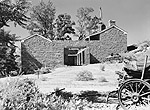Havasupai
Hopi
Hualapai
Kaibab Paiute
Events
Navajo
White Mountain Apache
Save the Peaks!
Merriam Report
Credits

Pipe Spring National Monument: Joint Visitor's Center and Museum, located just 15 miles west of Fredonia, Arizona, on state highway 389, is an oasis in the desert. With four springs in the immediate area and what used to be rich grasslands, Pipe Springs has long been inhabited by numerous groups of indigenous peoples. Ancestral Puebloan and Paiute Indians were the first people drawn to Pipe Springs National Monument by the water, which made it possible for plants, animals, and people to live in this dry, desert region. Both the Ancestral Puebloan and Paiute Indians gathered grass seeds, hunted animals, and raised crops near the springs for at least 1000 years. In the 1860s, Mormon settlers, attracted by the water and grasslands that provided sustenance for their livestock, moved into the area surrounding Pipe Springs and built a substantial fort directly around the spring in order to strictly control water access. In 1923, Pipe Spring was set aside as a National Monument to preserve this area's rich history.
Digital Resources
Pipe Spring National Monument
Websites
Area Parks - Pipe Spring National Monument
National Park Servive - Pipe Spring National Monument
The Mu'uputs Canyon hiking trail is near Pipe Spring National Monument. The trail is managed by the Kaibab Band of Paiute Indians' Wildlife, Fisheries and Park Department. Mu'uputs (the Paiute word for owl) Canyon trail is a one mile round trip hike. The canyon is rich with high desert plants as well as wildlife activity. Many petroglyphs (symbols pecked into rock) are visible on canyon walls. All hikes are guided and must be coordinated through the Kaibab Paiute Tribal Office. For hiking reservations and information, please call the tribal office at (928) 643-7245.

Steamboat Rock. North of Mu'uputs Canyon, Steamboat Rock is one of the more imposing formations rising in the background. The orange and red sandstone Vermilion Cliffs dominate the far horizons of the reservation.